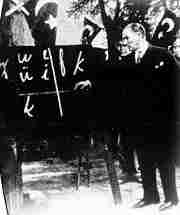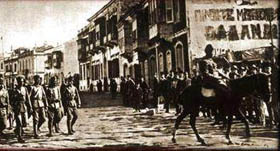 |
|
|
Turkish Reactions to the Asia Minor |
|
 |
 |
|
The Turkish reactions in Angora (Ankara) to Ward/Yowell eyewitness testimony was one of hostility and tried to dismiss such claims as lies and prevarications that were designed to caste Turkey in a damaging light in Europe and the United States. However Turkish opinion in Constantinople was divided due to the allied occupation of that city. The Turks responded in dismissing the atrocity stories as lies, distortions, and fabrications that were intended to depict Turkey in a negative light. Angora used the press as part of its strategy to dismiss the claims of Ward and Yowell. This was part of the denial tactics exercised by the perpetrator. The Anatolian News Agency published an article on May 20, 1922 trying to debunk Yowell’s allegations of atrocities in Anatolia as “lies.” It continued that “The accusations against the Angora Government for mistreatment of Christians in Anatolia have proven to be baseless on investigation made by Americans who travelled in Asia Minor.” In order to lend credibility to its news story, the Anatolian News Agency quoted Americans such as Florence Billings, an official of the Near East Relief (N.E.R), and H.C. Jacquith, the Director of N.E.R, who was visiting Angora at this time, who dismissed Yowell’s statement as being groundless. It was also critical of Lord Curzon, the British Foreign Secretary 1919-24, in believing such statements and creating commissions of enquiry to be sent to Anatolia. It concluded, “We are glad to hear that America has refused to participate in Curzon’s plan.” The Angora newspaper Hakimet-I-Mille’s editorial titled “England and us” published on May 22 was strongly anti-British accusing Britain of trying “to strangle [Turkey] and to [put] an end to our existence.” It concluded, “We are said to have massacred the Christians in Anatolia. This new comedy put to scene by Lord Curzon.” The plight and suffering of deported people into the Anatolian interior could hardly be described as a comical scene. The so-called Turkish Orthodox Church and Catholic Christian Communities protested to Papa Efthim Effendi and US High Commission regarding Yowell’s allegation of Christian persecution in Asia Minor. In the latter case, the Catholic Christian Communities stated that they lived “in perfect security in the bosom of justice of the Anatolian Turk” and “the Orthodox Christians of Anatolia are treated with the greatest courtesy, their lives and securities are assured by the Angora Government.” On the other hand, the Turkish Orthodox Church described Yowell’s assertions as “lies and slander against our national government.” They argued that the “Pontus incident cannot be concealed. The uprisers went to the mountains, revolted against our Government and pillaged our villages.” There is no doubt that such public pronouncements on the part of the Turkish Christians were part of Angora’s propaganda campaign to deflect criticism away from itself by shifting the blame onto the Greeks. It can also be argued that the creation of the Turkish Orthodox Church was a political weapon that the Kemalists could use to undermine the authority of the Ecumenical Patriarchate in Constantinople. Fethi Bey, the Minister of Interior in the Angora Government, explained to a correspondent of the Anatolian News Agency, that Yowell and Ward were asked to leave because they “spread lies about Turkey.” Fethi Bey’s remarks were intended to create an impression in western capitals that Turkey was treating its minorities with kindness and justice. He gave a few examples that: - (1) “Christian men are never put to prison without legal cause. Prison registers refute lies of this kind.” (2) “Christian women are not employed in Moslem houses against their will. These lies are spread about to picture the Turks as mean people.” (3) “Greeks were deported into the interior in good order have been left free.” He concluded that Yowell had a personal grudge against Turkey by helping to spread lies about “persecutions of the Christians.” The Kemalist Interior Minister, Fethi Bey was a very good spin doctor. The idea that Christian men were never incarcerated “without legal cause” and that “prison registers refute lies of this kind” would have been very difficult to prove, as the Angora Government had refused the proposed inter-allied commissions of inquiry to enter its territory. There was a lot of debate in the League of Nations in 1921-22 concerning the deportation of women and children in the Near East. In fact a Commission of Enquiry appointed by the Council of the League of Nations in February 1921 experienced difficulties in reclaiming deported women and children held in Moslem households in Turkey. On November 26, 1921 Monsignor Nicholas, Archbishop of Caesarea and Locum Tenens of the Ecumenical Patriarchate, appealed to the League of Nations requesting that it take the necessary measures to protect the Greeks from Turkish reprisals. No assistance was forthcoming from the League of Nations or Great Powers. Fethi Bey stated the “Greeks …deported into the interior in good order have been left free” requires a brief explanation. Many Greek men , women and children deported from Pontus died from “ starvation, exposure, typhus and dysentery,” These poor wretched souls were denied warm clothing and food and no wonder why they were “left free” to die. The Turkish press in Constantinople responded to the atrocities and proposed commission of inquiry to Anatolia. Rumbold, the British High Commissioner in Constantinople, informed Curzon that the position of the Turkish press varied in its coverage regarding the proposed commissions of enquiry. Some Turkish journalists believed that Angora had nothing to hide and would “welcome [an] enquiry provided it is properly conducted, and provided the same treatment is given to Turks and Greeks.” There were those who considered the proposed allied commission as “an illegitimate interference with Turkey’s internal affairs.” The editor of Wakt newspaper who was a Saloniac Crypto Jew stated that Turkey was at war with 3 of the powers and suggested that “if any enquiry, at all is necessary, it should be carried out by the Americans only.” What is interesting that according to Rumbold that the French authorities in Constantinople gave greater latitude to the local Turkish press to attack Britain, at time of strict press censorship in the Sultan’s Capital. Rumbold told General Pelle, the French High Commissioner, that while the Turks were given some latitude, it would be fair if the Greek press too was offered the opportunity to respond to the Turkish press. Pelle acquiesced to Rumbold’s views. In conclusion, the Kemalists used the press as a political tool in their propaganda campaign to try to refute Ward/Yowell’s eyewitness testimony. Again the Great Powers failed to assist the Greeks of Pontus in their hour of need. © 2005 Not to be reproduced or distributed without the consent of the author. |
|
(Posted originally in October 2005; reformatted March 2007) About the Author Stavros Terry Stavridis was born in Cairo, Egypt in 1949 of Greek parents. He migrated to Australia with his parents in September 1952. Stavros has a Bachelor of Arts (B.A) in Political Science/Economic History and B.A (Hons) in European History from Deakin University and M.A in Greek/Australian History from RMIT University. His MA thesis is titled "The Greek-Turkish War 1919-23: an Australian Press Perspective." Stavros has nearly 20 years of teaching experience, lecturing at University and TAFE (Technical and Further Education, the equivalent of Community College in the US) levels. He has presented papers at international conferences in Australia and USA and has also given public lectures both in Australia and on the West Coast of the US. Many of his articles have appeared in the Greek-American press. He currently works as a historical researcher at the National Center for Hellenic Studies and Research, Latrobe University, Bundoora, Victoria, Australia. Stavros' research interests are the Asia Minor campaign and disaster, Middle Eastern history, the Assyrian and Armenian genocides, Greece in the Balkan Wars 1912-13 and the First World War and history in general. Readers interested in the works of Stavridies may read more of his fine articles posted on HCS at the URL http://www.helleniccomserve.com/stavridisone.html. Read More About the Greeks of Asia Minor HCS maintains a permanent, extensive archives of articles which readers are invited to browse. For more information about Smyrna or Asia Minor Greeks, see the webpage located at the URL http://www.helleniccomserve.com/smyrnaopener.html |
|
|
|
|
